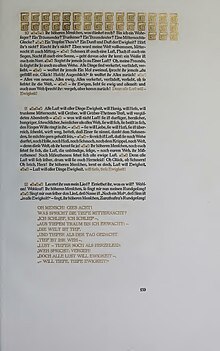

Zarathustra's roundelay (German: Zarathustra's Rundgesang),[1] also called the Midnight Song (Mitternachts-Lied[2]) or Once More (German: Noch ein Mal),[3] is a poem in the book Thus Spoke Zarathustra (1883–1885) by Friedrich Nietzsche.
The poem first appears in Thus Spoke Zarathustra's chapter "The Second Dance-Song", then reappears in a later chapter, "The Drunken Song".[3]
The poem was used by Gustav Mahler as the text of the 4th movement of his Symphony No 3.
- ^ Hollinrake, Roger (1982). "7. Zarathustra's Great Noon". Nietzsche, Wagner and the Philosophy of Pessimism. Routledge. p. 92. doi:10.4324/9780203092705. ISBN 978-0-203-09270-5.
- ^ Stegmaier, Werner (21 March 2019), Bertino, Andrea C. (ed.), "12. "Oh Mensch! Gieb Acht!" Kontextuelle Interpretation des Mitternachts-Lieds aus Also sprach Zarathustra", Europa im Geisterkrieg. Studien zu Nietzsche, OBP collection (in German), Cambridge: Open Book Publishers (published 2018), pp. 333–361, ISBN 979-10-365-2455-4, retrieved 2023-01-21
- ^ a b Puffett, Derrick (1998). "A Nietzschean Libretto: Delius and the Text for 'A Mass of Life'". Music & Letters. 79 (2): 244–267. doi:10.1093/ml/79.2.244. ISSN 0027-4224. JSTOR 854955.